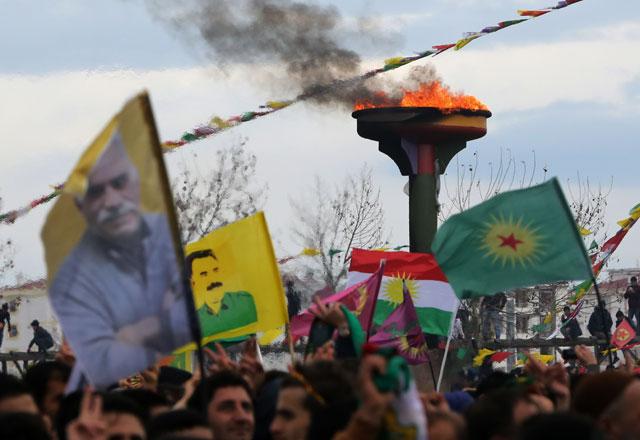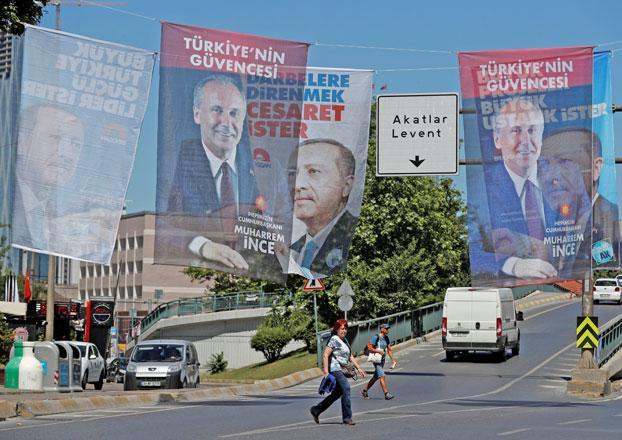You are here
Erdogan slams brakes on Kurdish peace process ahead of polls
By AP - Apr 08,2015 - Last updated at Apr 08,2015

DIYARBAKIR, Turkey — The peace process to end decades of violent strife between Turkey and Kurdish rebels has been one of Turkish leader Recep Tayyip Erdogan's signature achievements.
But with key parliamentary elections looming in June, the president has hit the brakes on peace talks — and exposed a rare rift within his own party.
Until recently, chances looked good for a deal that could see the Kurdistan Workers' Party, or PKK, lay down its arms after a three-decade insurgency that has left tens of thousands dead. Last month, imprisoned Kurdish rebel leader Abdullah Ocalan was allowed to release a statement in Kurdish read out to hundreds of thousands of Kurds celebrating a Kurdish holiday in Diyarbakir, the symbolic heart of Turkey's Kurdish southeast. A decade ago, neither the celebration nor the statement would have been conceivable.
The event was part of a calibrated effort towards a final deal that would include legislating greater autonomy and rights for Kurds, who make up 20 per cent of Turkey's 78 million people.
The negotiations, begun secretly in late 2012 with Ocalan, were a political risk for Erdogan in a country that has often demonised the Kurdish rebels. Turkish leaders going back to the Republic's founder Mustafa Kemal Ataturk had maintained harsh repressions of Kurdish culture, even calling Kurds "mountain Turks" to deny their separate ethnic identity.
But the ceasefire negotiated in the talks has been a boon to Erdogan and the country. In return Erdogan has eased some of the restrictions pending a more comprehensive deal.
Early last month, negotiators under Prime Minister Ahmet Davutoglu and Kurdish members of parliament held a joint press conference, while emissaries shuttled to Ocalan's island prison for talks. The rebel leader, in statements read at the festival, called on PKK militants to abandon arms for good and seek a democratic solution.
Then, Erdogan abruptly sounded a halt.
Just days before the Kurdish celebration, he asserted that "there is no Kurdish question" — implying that Kurds grievances had already been addressed. Then he castigated his own party members for considering a key concession demanded by the Kurds.
This provoked rare criticism of Erdogan by a party elder, Deputy Prime Minister Bulent Arinc, who was a co-founder with Erdogan of the Justice and Development Party, or AKP. Arinc accused Erdogan of meddling in the negotiations, which he said should be the responsibility of the prime minister, and vowed that the government would plow ahead.
Erdogan, who sits astride an increasingly authoritarian government, appears to have won. Last month, in a blow to the peace process, parliament passed a security bill giving broad new powers to the police. Kurdish parties and PKK militants had included defeat of the bill among a list of demands for the talks to move forward.
The explanation for Erdogan's gambit appears to lie in electoral politics and his own future ambitions to change the constitution and head a strong presidential system. Amid signs that opposition parties including the Kurdish HDP are gaining support, Erdogan appears to have concluded that further peace moves won't aid his cause.
In previous elections the HDP has sent a relatively small number of legislators to parliament by running as independents. But this time, the party, led by the charismatic Selahattin Demirtas, seems to be in reach of a 10 per cent threshold required for entering parliament as a party. If they make it, Erdogan will almost certainly not obtain the supermajority needed to make constitutional changes.
"Erdogan has a plan and that is to increase tensions and polarisation ahead of the elections. This plan has worked well for him in the past," said Sukru Kucuksahin, a columnist for the liberal Turkish daily Hurriyet. "The HDP falling below the threshold would greatly benefit the AKP and the government is doing all it can to ensure it does."
But the gamble could backfire, as many non-Kurdish liberals seem intent on voting HDP to catapult it into parliament.
One such voter, Cem Terzih, a doctor and peace activist from the staunchly secularist redoubt of Izmir, was in in Diyarbakir for the Kurdish celebrations. "HDP getting in will stop Erdogan's big ambitions," he said.
Erdogan may hope that in that event he can trade concessions to the Kurds for HDP support on constitutional changes. But following Erdogan's recent comments, Demirtas ruled that out.
"Mr. Recep Tayyip Erdogan, as long as the HDP exists, as long as the HDP continues to breathe on these lands," he said, "you will never be the head [of a presidential system]".
Despite the escalation of rhetoric, Kurds in Diyarbakir seem confident that the peace process is already too far along to go backwards.
"All the people in this country have suffered violence for so long, they know the value of peace," said H. Sherife Farqin, an 84-year-old practitioner of traditional Kurdish verse. "After the election, they will demand it."
Related Articles
DIYARBAKIR, Turkey — Turkey's Kurds on Monday marked the annual spring festival of Nowruz with a call for the resumption of peace talks betw
DIYARBAKIR, Turkey — Turkey's Kurds are set to play a critical role in determining the outcome of elections this month, with their votes cov
Jailed Kurdish rebel leader Abdullah Ocalan on Saturday called for Kurds to hold a historic congress to end a decades-long armed struggle against the Turkish state that has claimed tens of thousands of lives.












